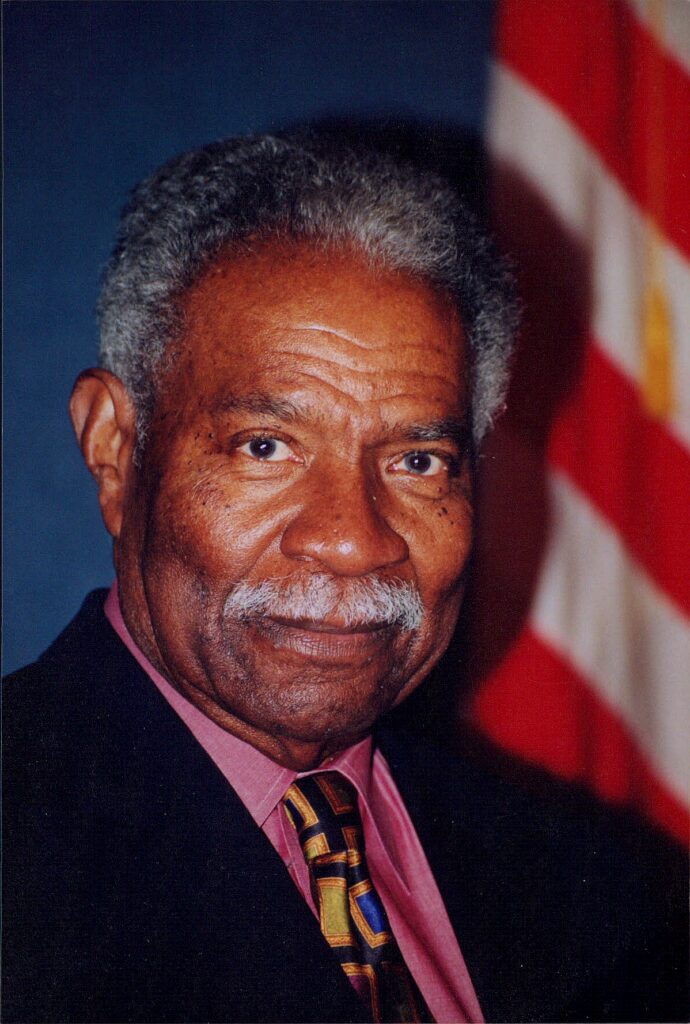
Purlie Victorious: A Non-Confederate Romp through the Cotton Patch is one of the many productions that debuted during the 2023-24 Broadway season. The comedy, directed by Kenny Leon and starring Leslie Odom Jr. as a Black traveling preacher in the 1950s trying to save his hometown church in Georgia, is a revival that debuted at the Music Box Theatre on September 27, 2023. Ossie Davis, a prominent playwright and performer, wrote and starred in the original, which opened at the James Earl Jones Theatre, then known as the Cort Theatre, in 1961.
Davis, who lived from 1917 until 2005, is one of the most influential Black actors and playwrights of his era. He was a civil rights activist who appeared in dozens of film and TV projects and also performed in live theater productions for more than 55 years. Below is a closer look at his life and impact on American society and theater.
Civil Rights Activist
A leading civil rights activist during the 1960s, Davis, along with his wife Ruby Dee, regularly worked with civil rights organizations, including the NAACP and Southern Christian Leadership Conference, and helped stage some of the largest demonstrations and rallies in the US. He and Dee were emcees at the 1963 March on Washington for Jobs and Freedom.
Davis was also close friends with Dr. Martin Luther King Jr. and Malcolm X. He read the eulogy at the latter’s funeral in 1965 and also delivered an emotional tribute to Dr. King at a memorial in New York City the day after he was assassinated. The NAACP inducted both Davis and Dee into its Image Awards Hall of Fame in 1989.
Marriage to Ruby Dee
Davis married Dee in 1949, three years after they met on the set of Robert Ardey’s Jeb on Broadway. Not only were they both engaged in important activism, they also starred together in several films that remain part of the fabric of American culture, including Spike Lee’s Jungle Fever, School Daze, Get on the Bus, and Malcolm X. Davis even recounts part of the eulogy he gave at Malcolm X’s funeral in the 1992 film. They first appeared on screen together in Joseph L. Mankiewicz’ No Way Out (1950) alongside Sidney Poitier and Richard Widmark.
As cultural icons, Davis and Dee deservedly received awards and honors from several institutions. They are recipients of the National Medal of the Arts, Kennedy Center Honors, and the Screen Actors’ Guild (SAG) Lifetime Achievement Award.
“For more than half a century, they have enriched and transformed American life as brilliant actors, writers, directors, producers, and passionate advocates for social justice, human dignity, and creative excellence,” said SAG president William Daniels.
Distinguished Career in Theater
A member of the American Theater Hall of Fame Class of 1994, Davis began his theater career in 1939 in New York with the Rose McClendon Players and, in subsequent years, appeared in stage productions such as Joy Exceeding Glory, Booker T. Washington, and Black Women in White. He pushed back against industry expectations of Black actors playing stereotypical characters and instead pursued—and created—more authentic and distinguished roles.
Davis made his Broadway debut in Jeb and later performed roles in The Royal Family, Remains to Be Seen, The Wisteria Trees, and A Raisin in the Sun. He wrote the book for and starred in Purlie Victorious in 1961 and last appeared on Broadway in 1987 in I’m Not Rappaport.
Film and TV Work
While he had a lengthy and notable career in theater, Davis is more known for his work in film and TV. He had a few minor roles before creating Purlie Victorious and, in 1963, starred in the film adaptation of the play titled Gone Are the Days! He later appeared in or voiced characters in more than 40 films and documentaries, including Harry & Son (1984), Do the Right Thing (1989), and I’m Not Rappaport (1996).
Davis also appeared in several TV shows and movies, including the 1798 miniseries King, in which he portrayed Reverend Martin Luther King Sr. He was also in Roots: The Next Generations (1979), and 12 Angry Men (1997). He performed right up until the end of his life, starring in The L Word in 2004-05.
In addition, Davis was one of the few Black directors in the 1970s, during which time he directed films such as Cotton Comes to Harlem (1970), Black Girl (1972), and Countdown at Kusini (1976).
The Original Purlie Victorious
Purlie Victorious opened on Broadway on September 28, 1961 and ran for 261 performances until May 13, 1962. Philip Rose and Howard Da Silva produced and directed the play, respectively, while the cast also included Dee, Alan Alda, Beah Richards, Sorrell Brooke, and Godfrey Cambridge. Dr. King celebrated with the cast and crew following its 100th performance.

